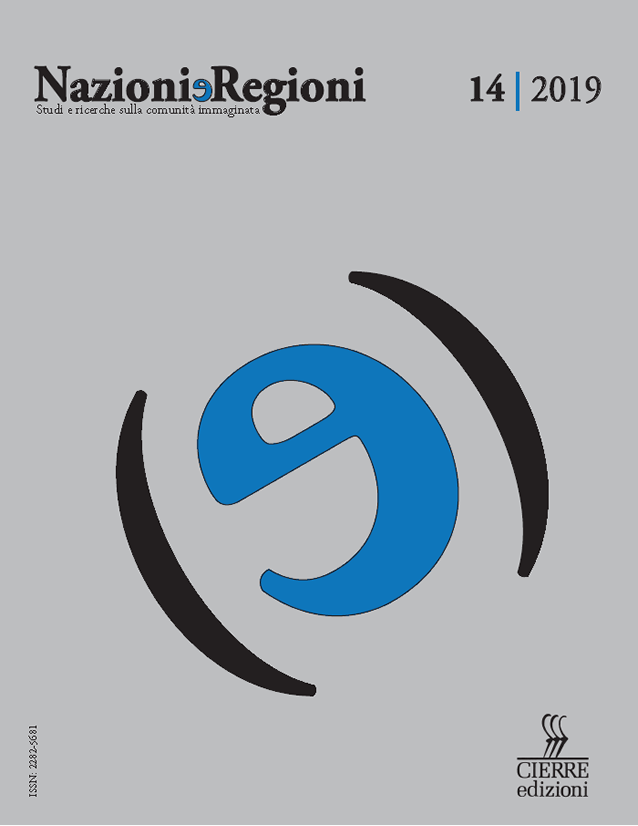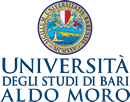Il nazionalismo sub-statale di fronte all’alterità: identità mediate in Friuli<br><br>Sub-state nationalism and its other(s): mediated identities in Friuli
DOI:
https://doi.org/10.15162/2282-5681/1367Parole chiave:
nazioni sub-statali, nazionalismo, identità, media, Friuli, sub-state nations, nationalism, cultural identityAbstract
Il continente europeo sta attualmente vivendo una rinascita dei movimenti nazionalisti che si stanno infiltrando nella politica mainstream e nella società degli stati-nazione. Allo stesso tempo, le nazioni substatali stanno complicando la lotta per il potere e l’identità nazionale con i loro particolari programmi politici ed identitari. Questo articolo esplora la questione considerando il sostanzioso caso del Friuli, una nazione sub-statale nel nord-est dell’Italia, analizzando come i media locali costruiscono, sviluppano e negoziano l’identità friulana in relazione all’Europa, lo Stato italiano e le altre comunità sub-statali.
The European continent is currently experiencing a resurgence of nationalist movements that are infiltrating into mainstream politics and society. Sub-state nations are complicating this national power and identity struggle with their own specific agendas negotiated against and through the nation-state and the supranational frameworks. This explorative article considers the rich case study of Friuli, a sub-state nation in the north-east of Italy, and it analyzes how local media construct, develop, and negotiate the Friulian identity in relation to Europe, the Italian nation-state and other sub-state communities.
Riferimenti bibliografici
Anderson B. (1983), Imagined Communities: Reflections on the Origins and Spread of Nationalism, Verso-New Left Books, London.
Balibar E. – Wallerstein I. (eds.) (1991), Race, Nation, and Class: Ambiguous Identities, Verso, London.
Bufon M. (2016), «Minorities and Minority Toponyms in Multicultural Areas of the Border Region of Friuli Venezia Giulia in Italy», Onomastica, n. 2, pp. 155-170.
Clement A. A. (2017), «Integration Against the Nation? The Persistence of National Identities in Shaping Popular Press Discourse Regarding EU Integration in Poland, the UK and Spain», EURINT, n. 90, p. 112.
Conversi D. (1990), «Language or race?: The Choice of Core Values in the Development of Catalan and Basque nationalisms», Ethnic and Racial Studies, n. 13, vol. 1, pp. 50-70.
Dainotto R.M. (2007), Europe (in Theory), Duke University Press, Durham.
Franco-Guilléen N. (2016), «Selfishness of the Affluent? Stateless Nationalist and Regionalist Parties and Immigration», Journal of Ethnic and Migration Studies, n. 42, vol. 8, pp. 1304-1316.
Ganis A. (2019), «The Global in the Life of a Small Town: The Case of Udine», Perspectives on Global Development and Technology, n. 18, vol. 1. pp. 157-172.
Jeram S. et alii (2016), «Friends or Foes? Migrants and Sub-State Nationalists in Europe», Journal of Ethnic and Migration Studies, n. 42, vol. 8, pp. 1229-1241.
Jeram S. (2014), «Sub-State Nationalism and Immigration in Spain: Diversity and Identity in Catalonia and the Basque Country», Ethnopolitics, n. 13, vol. 3, pp. 225-244.
Linke U. (2003), «There is a Land where Everything is Pure. Linguistic Nationalism and Identity Politics in Germany», Race, Nature, and Politics of Difference, Duke University Press, Durham.
Littlejohn W. L. – Foss K. A. (2011), Theories of Human Communication, Waveland Press, Long Grove IL.
Lluch J. (2011), «Sovereigntists and Associationists: Explaining the Origins of National Movements’ Political Orientation», Nationalism and Ethnic Politics, n. 17, vol. 2, pp. 203-24.
Medrano J. D. – Gutiérrez P. (2001), «Nested Identities: National and European Identity in Spain, Ethnic and Racial Studies», n. 24, vol. 5, pp. 753-778,
Merrill H. (2014), «Postcolonial Borderlands: Black Life Worlds and Relational Place in Turin, Italy», ACME, n. 13, vol. 2, pp. 263–294.
Montesquieu Ch.-L. (2004), Lo spirito delle leggi, BUR, Milano [1748].
Mucignat R. (2014), The Friulian Language: Identity, Migration, Culture, Cambridge Scholars Publisher, Cambridge.
Olivieri V. M. (2015), «Sub-state Nationalism in Spain: Primers and Triggers of Identity Politics in Catalonia and the Basque Country», Ethnic and Racial Studies, n. 38, vol. 9, pp. 1610-1626.
Özkırımlı U. – Pinar U. S. (2011), «Pater Familias and Homo Nationalis: Understanding Nationalism in the Case of Turkey», Ethnicities, n. 11, vol. 1, pp. 59-79.
Pieterse J. N. (2008), «Europe and its Others», in Goldberg D. T. – Solomos J. (eds.), A Companion to Racial and Ethnic Studies, Blackwell, Oxford.
Sassen S. (2010), «The Global inside the National: A Research Agenda for Sociology», Sociopedia ISA.
Skey M. (2015), «Mindless Markers of the Nation’: The Routine Flagging of Nationhood Across the Visual Environment», Sociology, n. 51, vol. 2, pp. 274-289.
Smith A. D. (1971), Theories of Nationalism, Duckworth, London.
Smith A. D. (1986), The Ethnic Origins of Nations, Blackwell, Oxford.
Smith A. D. (1998), Nationalism and Modernism, Routledge, London-New York.
Smith A. D. (2005), «The Genealogy of Nations. When is the Nation?», in Ichijo A. – Uzelac G. (eds.), When is the Nation? Towards an Understanding of Theories of Nationalism, Routledge, London, pp. 94-112.
Stolfo M. (2015), «Friuli e Friulano tra negazionisti, minimalisti e positivisti», in Di Giacomo M. et alii (a cura di), Piccole tessere di un grande mosaico: nuove prospettive dei regional studies, Aracne, Roma, pp. 321-339.
Tsaliki L. (1995), «The Media and the Construction of an ‘Imagined Community – The Role of Media Events on Greek Television», European Journal of Communication, n. 10, vol. 3, pp. 345-370.
van der Zwet A. (2016), «To See Ourselves as Others See Us: Identity and Attitudes towards Immigration amongst Civic Nationalists», Journal of Ethnic and Migration Studies, n. 42, vol. 8, pp. 1242-1256.
Downloads
Pubblicato
Fascicolo
Sezione
Licenza
Nazioni e regioni è una rivista open access che applica la licenza Creative Commons CC BY-NC-ND 4.0 a tutti i contenuti pubblicati.
Nazioni e regioni is an open-access journal that applies the Creative Commons CC BY-NC-ND 4.0 licence to all published contents.







